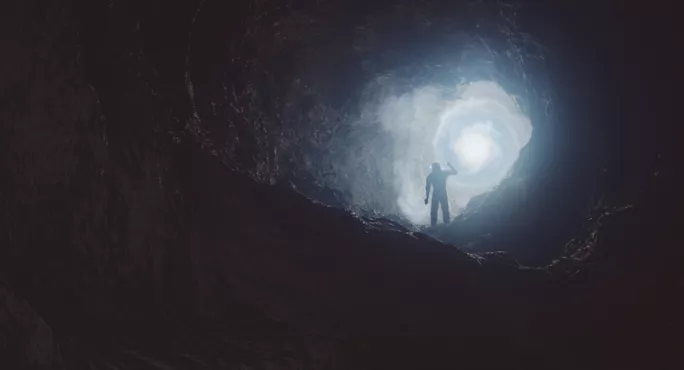Why teaching can feel like living in a dark cave

At the end of April 2021, a team of 15 volunteers emerged squinting into the sunlight after spending 40 days living in the darkness of a French cave.
That’s about six weeks, roughly half a term in the educational chronology some of us live by. The volunteers in the deep French cavern were together all that time and had no access to daylight, or to anything which would give them any sense of time. They were in their own, self-enclosed little world. The idea was to test not only how a group would interact in such cramped conditions but also to see how the body and mind react to the removal of normal markers of time. The exercise was part of what is called the Deep Time project, aimed at gleaning knowledge that might help humanity in circumstances we could face in the future.
While they were in the cave, the volunteers argued, resolved their differences and ran around in circles to keep fit. The 40 days reset their body clocks. Since the normal human circadian rhythm runs at slightly longer than 24 hours, the volunteers slipped into a non-regular routine, out of step with the outside world, and most thought they were only 30 days into their stay when the final whistle was eventually blown. One person thought it had only been 23 days. They completely lost track of normal time. I feel like that sometimes when it comes to terms and the end of the academic year.
News: Some ‘won’t get level 3’ after qualifications reform
Need to know: Btecs that overlap with T levels to lose funding
Exams 2022: Are we looking at an even bigger crisis?
Free at last, free at last
Those volunteers reminded me of teachers emerging at the end of the summer term. Every year, mid July, teachers emerge from school gates and college doors blinking into the sunlight, confused. Is that it? Are we done? Are we really finished? Already? At last? We can go now? Outside, the skies are clear, the birds are singing, clouds are scudding by and teachers blink back their shock at the bright world outside, pale and puzzled by what’s befallen them. Free at last, free at last. Thank God almighty.
Teachers can get so absorbed in their work, so consumed by the many tasks involved in education, that it can easily take over their lives. Ask any partner of a teacher and I am sure they will tell you that, sometimes, they can lose their other half for some of the term. It’s as if people in education enter a long tunnel and only emerge some distant time later.
For all the mockery of teachers’ holidays, it is clear that the teacher’s workload is crammed into a shorter period of time than is true for most workers, meaning the gaps between terms are earned, well-deserved and absolutely required. Some teachers work up to 60 hours per week and the average teacher week is round 50 hours long.
And, in further education, a lot of those hours are worked at anti-social, unfamily-friendly times. We run at 100 miles an hour during term time and then tumble to a halt in the holidays. That cycle can come with its problems. It is why so many teachers can take a while to readjust at the end of a term.
The first days of a holiday can be a time when many educationalists experience something of a slump. Arguments at home are not unheard of and falling sick is far from unusual. Researchers have given a name to such a period of illness, calling it “leisure sickness”. I suspect we have all been there. Or we will be soon.
I think this is why there can be such a camaraderie among teachers and people working in education. After all, who else knows what it’s really like? Every profession has its idiosyncratic ways, its distinct traditions and habits, its own all-encompassing systems and closed self-referential worlds. There’s no doubt teaching can be a strange job to do, and it can be an odd, all-consuming, soul-confusing lifestyle that goes with it.
That’s why teachers need each other to get through it all. Tensions can build up within teams, it is true, and arguments might have to be resolved. And you might well find you spend more than your fair share of time running around in circles, just like the French Deep Time volunteers.
An interesting element of the Deep Time experiment was studying how the group of volunteers synchronised with each other. Whatever their own normal individual sleep patterns, they started to coincide with their peers. It’s similar in many staffrooms, I suspect, which can develop distinct social micro-climates, as if they are self-enclosed worlds of their own, like some lost HG Wells realm. But now it’s over. We’re coming out of the tunnel, emerging from the cave.
The difference between teaching and the people in the cave is that, at the end of their project, two-thirds of the Deep Time cavers expressed a desire to remain underground. I doubt you’ll see too many teachers at the end of this year who are fighting to get back into the classroom. Relax, you don’t need to. It’s true: it’s over. We can go now. We’ve done it, and we’ve done well. And, remember - the pubs are open.
You need a Tes subscription to read this article
Subscribe now to read this article and get other subscriber-only content:
- Unlimited access to all Tes magazine content
- Exclusive subscriber-only stories
- Award-winning email newsletters
Already a subscriber? Log in
You need a subscription to read this article
Subscribe now to read this article and get other subscriber-only content, including:
- Unlimited access to all Tes magazine content
- Exclusive subscriber-only stories
- Award-winning email newsletters